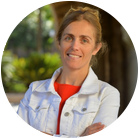COVID-19: The Impact in Africa
Event Details:
Location
This event is open to:
On Wednesday, September 16, 2020 at 11:00 AM PT, the King Center on Global Development held a special virtual event with the Center for Innovation in Global Health.
While the spread of COVID-19 across sub-Saharan Africa has been more modest than once feared, the strict lockdown measures and the global economic shock have disrupted livelihoods and stalled efforts against other health scourges in the region such as HIV and TB. During this panel discussion, leading experts analyzed the impacts of the pandemic on health, livelihoods, and the economic outlook in countries across sub-Saharan Africa.
The speakers were Belinda Archibong, assistant professor of economics at Barnard College, Columbia University, Agnes Binagwaho, vice-chancellor of the University of Global Health Equity (UGHE), and Albert G. Zeufack, the World Bank’s chief economist for Africa. The discussion was moderated by Pascaline Dupas, the King Center faculty director and professor of economics.
Watch the recording of the event.
About the speakers:

Belinda Archibong is an assistant professor of economics at Barnard College, Columbia University. Her research areas include development economics, political economy, economic history and environmental economics with an African regional focus. Her research investigates the role of institutions and environment in inequality of access to public services and the development of human capital. Some current research studies the effects of epidemics on gender gaps in human capital investment, the politics and economic burden of epidemic disease, and the impact of air pollution from gas flaring on human capital outcomes; with a focus on the ways in which institutions mitigate or exacerbate the impacts of climate change and environment on inequalities around gender and marginalized groups. Other works study the economics of prisons, the links between taxation and public service provision and the role of gender and ethnic bias in hiring in African countries. She is a faculty affiliate at Columbia University's Center for Development Economics and Policy (CDEP), The Earth Institute at Columbia University, the Institute of African Studies, the Institute for Research in African-American Studies, the Columbia Population Research Center (CPRC), and the Center for Environmental Economics and Policy (CEEP).
She joined the Barnard economics faculty in 2015 and received a BA in economics/philosophy and a PhD in sustainable development from Columbia University.

Professor Agnes Binagwaho, MD, M(Ped), PHD currently resides in Rwanda and is the vice-chancellor of the University of Global Health Equity (UGHE). She is a Rwandan pediatrician who returned to Rwanda in July of 1996, two years after the 1994 Genocide Against the Tutsi. Since then, she has provided clinical care in the public sector, served the Rwandan Health Sector (2001-2016) in high-level government positions, first as the executive secretary of Rwanda's National AIDS Control Commission, then as permanent secretary of the Ministry of Health, and five years as minister of health.
Professor Binagwaho is specialized in emergency pediatrics, neonatology, and the treatment of HIV/AIDS. She completed her MD at the Universite Libre de Bruxelles and her MA in pediatrics at the Universite de Bretagne Occidentale. She was also awarded an honorary doctor of science from Dartmouth College and earned a doctor of philosophy from the University of Rwanda College of Medicine.
Professor Binagwaho co-founded the University of Global Health Equity (UGHE), an initiative of Partners In Health, which focuses on changing how health care is delivered around the world by training global health professionals who strive to deliver more equitable, quality health services for all.
She currently serves as a senior advisor to the Director General of the World Health Organization, and as a member of multiple advisory board and board of directors including the Rockefeller Foundation Board. Professor Binagwaho’s academic engagements include research in implementation sciences, research on human rights to health, health services delivery systems strengthening, HIV/AIDS, and pediatric care. She has published over 190 peer- reviewed articles.

Dr. Albert G. Zeufack, a Cameroonian national, is the World Bank’s chief economist for Africa. Prior to his appointment in May 2016, he was practice manager in the macroeconomics and fiscal management global practice and leader of the World Bank-wide community of practice for the management of natural resources rents. His main research interest is in the micro-foundations of macroeconomics.
Zeufack joined the World Bank in 1997 as a young professional and started his career as a research economist in the macroeconomics division of the research department. Since then, he has held several positions in Africa, East Asia and Pacific, Europe and Central Asia regions. Between 2008 and 2012, on leave from the World Bank, he was the director of research and investment strategy/chief economist for Khazanah Nasional Berhad, a Malaysian sovereign wealth fund.
Zeufack received his PhD in economics from CERDI, the University of Clermont-Ferrand (France) where he taught before joining the World Bank. He holds a masters degree in economic analysis and policy from the University of Yaoundé (Cameroon) and has received executive education from Harvard University and Stanford University. Zeufack is a member of the Technical Advisory Committee of the Natural Resource Charter in Oxford University, a member of the advisory board of the Natural Resource Governance Institute (NRGI), a member of the United Nations’ Sustainable Development Network, and a member of the board of the African Economic Research Consortium (AERC). In 2016, Jeune Afrique nominated him as one of the “50 Africans who mattered in 2016.”

Pascaline Dupas is the King Center faculty director and a professor of economics at Stanford University. She is also a senior fellow at the Stanford Institute for Economic Policy Research (SIEPR) and a senior fellow at the Freeman Spogli Institute (FSI). Dupas is a development economist whose research seeks to identify interventions and polices that can help reduce global poverty. Her ongoing research include studies of education policy in Ghana, family planning policy in Burkina Faso, digital credit regulation in Malawi, and government subsidized health insurance in India.
Dupas is on the executive committee of the Jameel Poverty Action Lab (JPAL), on the board of directors of the Bureau for Research and Economic Analysis of Development (BREAD), and a research associate at the National Bureau for Economic Research (NBER). She is a fellow of the Econometric Society and was a 2019 Guggenheim Fellow. Dupas studied philosophy and economics as an undergraduate student at the Ecole Normale Superieure (Ulm) in Paris, France. She obtained a PhD in economics from the École des Hautes Études en Sciences Sociales (Paris, France) in 2006.
Related Topics
Explore More Events
-
-
Lectures & Discussions
Geopolitics and Its Impact on Global Trade and the Dollar
-Gunn SIEPR Building


